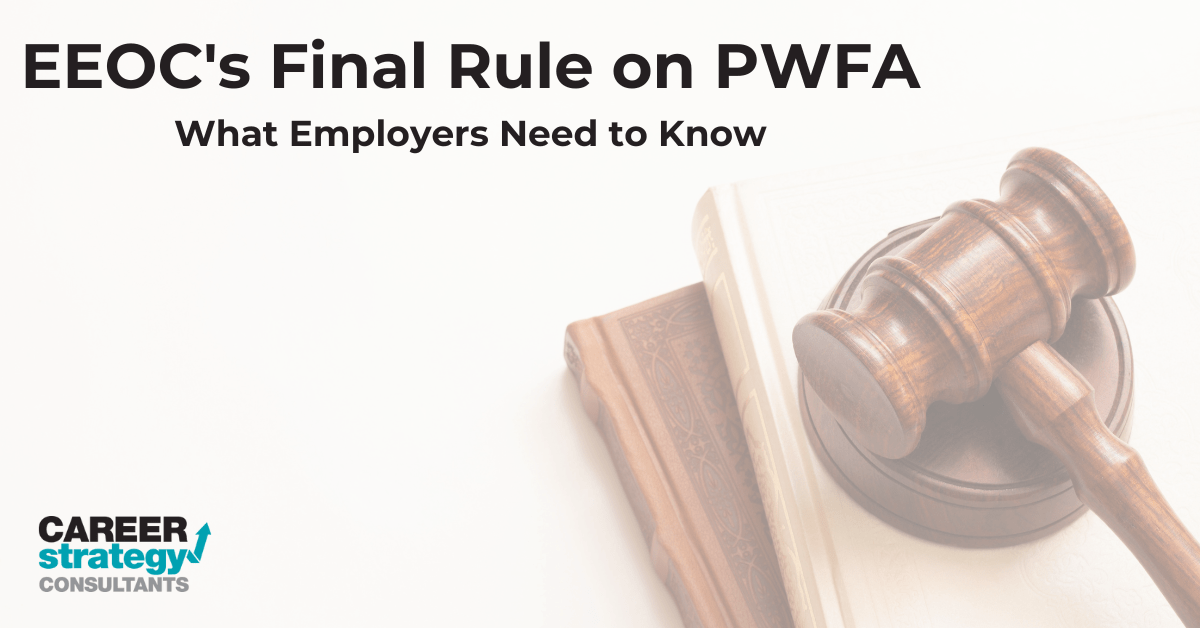EEOC’s Final Rule on PWFA: What Employers Need to Know


The Equal Employment Opportunity Commission (EEOC) has released the final regulations for implementing the Pregnant Workers Fairness Act (PWFA), a significant development for employers and employees alike. These new regulations, which include provisions for abortion accommodations, have sparked both applause and controversy. Here’s what employers need to know about the EEOC’s final rule on the PWFA.
Understanding the PWFA and Its Implications
The PWFA aims to provide accommodations for pregnant workers, covering conditions related to pregnancy, childbirth, and related medical conditions. The EEOC’s final rule extends these accommodations to include abortion, a decision that has generated considerable public and political discourse.
Key Provisions of the Final Rule
- Abortion Accommodations: The final rule includes abortion under “pregnancy, childbirth, or related medical conditions.” This means that employees can request reasonable accommodations for abortion procedures, including time off for the procedure and recovery. However, employers and healthcare providers are not required to fund or cover the cost of abortions or related travel expenses.
- Religious and Moral Objections: The EEOC acknowledges that many individuals and employers have deeply held religious or moral objections to abortion. The final rule states that these objections will be considered on a case-by-case basis, ensuring a balanced approach that respects both employees’ rights and employers’ beliefs.
- Additional Accommodations: Beyond abortion, the PWFA covers a range of accommodations for pregnant workers. These include additional breaks for water and restroom use, time off for healthcare appointments, temporary job reassignments, telework options, and accommodations for lactation.
Detailed Accommodations Under PWFA
The final regulations provide specific examples of reasonable accommodations, including:
- Breaks: Additional breaks for eating, drinking water, or using the restroom.
- Workplace Adjustments: Provision of stools or chairs for employees who need to sit while working.
- Healthcare: Time off for health care appointments, including those related to pregnancy and recovery from childbirth.
- Temporary Changes: Temporary reassignment or suspension of certain job duties that may pose a risk to pregnant workers.
- Remote Work: Opportunities for telework to accommodate medical needs and recovery periods.
- Lactation Support: Enhanced accommodations for breastfeeding, including designated lactation spaces with necessary amenities.
Documentation and Self-Confirmation
The EEOC encourages employers to minimize documentation requirements for pregnant workers seeking accommodations. The final rule specifies that for predictable assessments, such as lactation, employers should primarily rely on self-confirmation rather than extensive documentation. However, employers may seek reasonable documentation to confirm the physical or medical condition and the need for accommodation.
What Employers Should Do Next
Given the extensive implications of the PWFA and the EEOC’s final rule, employers should take proactive steps to ensure compliance and support their pregnant workers effectively. Here are some recommended actions:
- Review and Update Policies: Employers should review their current policies on pregnancy accommodations and update them to align with the new EEOC regulations. This includes incorporating provisions for abortion accommodations and other related medical conditions.
- Train Management and HR Staff: It’s crucial to train management and human resources personnel on the new regulations to ensure they understand the requirements and can handle accommodation requests appropriately.
- Communicate with Employees: Employers should clearly communicate the updated policies and available accommodations to all employees. This transparency helps foster a supportive work environment and ensures that employees are aware of their rights.
- Consult Legal Counsel: Given the legal complexities and potential for religious and moral objections, employers should consult with legal counsel to navigate the nuances of the PWFA and ensure compliance while respecting their own organizational values.
Conclusion
The EEOC’s final rule on the PWFA marks a significant step in protecting the rights of pregnant workers and ensuring they receive necessary accommodations. Employers must stay informed and proactive in implementing these regulations to create a supportive and compliant workplace.
Legal Disclaimer: This blog is for informational purposes only and does not constitute legal advice. Employers should consult with an attorney to address specific legal concerns and ensure compliance with applicable laws.

More Than Just Staffing
For Employers
For Individuals
